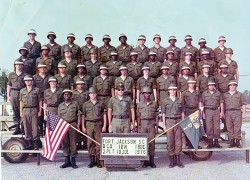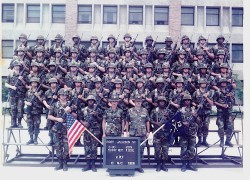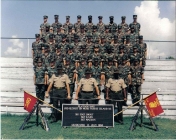Specialty Summary. Manages, supervises, and performs electromagnetic spectrum management activities.
Duties and Responsibilities:
Engineers, nominates, and assigns frequencies to support communications and operational requirements. Coordinates frequency needs with federal, military, and civil spectrum management offices. Secures operating authority, and promotes interference-free radio frequency (RF) operations. Reviews spectrum interference reports and helps resolve electromagnetic interference problems.
Analyzes RF spectrum requirements and determines compatibility with other users, considering transmitter and receiver specifications, antenna data, emission characteristics, and modes of radio wave propagation. Examines radio link deficiencies and recommends corrective action to improve system performance. Reviews spectrum engineering requirements and recommends solutions to electromagnetic compatibility problems.
Maintains frequency records and associated databases. Provides guidance on the spectrum certification process for electromagnetic radiating and receiving equipment planned for introduction into the DoD inventory, and for modifications to existing equipment. Reviews plans and programming documents spectrum management actions. Prepares and reviews frequency annexes for contingency and operations plans. Examines spectrum allocation data and frequency assignment records to ascertain suitability of specific equipment planned for deployment.
Performs as joint task force spectrum manager. Provides spectrum management guidance to units deploying RF radiating equipment to support contingency, exercise, or wartime requirements. Analyzes and de-conflicts frequency assignments and databases to develop joint communications and electronics operating instructions.
Evaluates and assists electromagnetic spectrum management activities. Determines if spectrum support is adequate and recommends changes. Educates customers on optimal and proper use of the RF spectrum. Plans for current and future RF spectrum needs.
Specialty Qualifications:
Knowledge. Knowledge is mandatory of: radio propagation factors, including effects of antenna design, power, type of emission, frequency, and effects of terrain; national, international, and military regulations governing use of the RF spectrum.
Education. For entry into this specialty, completion of high school with courses in algebra, geometry, and physics is desirable.
Training. For award of AFSC 3C132, completion of the electromagnetic spectrum management course is mandatory.
Experience. The following experience is mandatory for award of the AFSC indicated:
3C152. Qualification in and possession of AFSC 3C132. Also, experience performing spectrum management engineering, selection, negotiation, and interference problems.
3C172. Qualification in and possession of AFSC 3C152. Also, experience supervising electromagnetic spectrum engineering, selection, negotiation, and interference resolution.
3C192. Qualification in and possession of AFSC 3C172. Also, experience managing electromagnetic spectrum engineering, selection, negotiation, and interference resolution.
Other. The following are mandatory as indicated: For entry into this specialty: Prior qualification at the 5-skill level or higher in AFSC 1A3X1, 2EXXX, 3C1X1, or 3C2X1. For entry, award, and retention of these AFSCs, must maintain eligibility to deploy and mobilize worldwide. For award and retention: Must maintain an Air Force Network License according to AFI 33-115, Vol 2, Licensing Network Users and Certifying Network Professionals, for AFSCs 3C152/72/92/00. Specialty requires routine access to Secret material or similar environment. For award and retention of AFSCs 3C1X2, completion of a current National Agency Check, Local Agency Checks and Credit (NACLC) according to AFI 31‑501, Personnel Security Program Management. NOTE: Award of the 3-skill level without a completed NACLC is authorized provided an interim Secret clearance has been granted according to AFI 31-501.
-
You are here:
- Home
- References
- Military Occupation Codes
- USAF
- 3C - Communications Computer Systems
- 3C1X2 - Electromagnetic Spectrum Management

Search the Site
Contribute
USAF AFSC Codes
- 2G - Logistics Plans (1)
- 2M - Missile & Space Systems Maintenance (3)
- 2P - Precision Measurement Equipment Laboratory (1)
- 2R - Maintenance Management Systems (2)
- 2S - Supply (1)
- 2T - Transportation & Vehicle Maintenance (7)
- 2W - Munitions & Weapons (3)
- 3D - Cyberspace Support (11)
- 3E - Civil Engineering (12)
- 3H - Historian (1)
- 3M - Services (1)
- 3N - Public Affairs (5)
- 3P - Security Forces (Military Police) (1)
- 3S - Mission Support (4)
- 4X - Medical (17)
- 4Y - Dental (2)
- 5J - Paralegal (1)
- 5R - Chaplain Assistant (1)
- 6C - Contracting (1)
- 6F - Financial (1)
- 7S - Special Investigations (OSI) (1)
- 8X - Special Duty (20)
- 9X - Special Reporting (1)
- 2E - Electronics Systems (8)
- 3A - Knowledge Operations Management (1)
- 3C - Communications Computer Systems (6)
- 1A - Aircrew Operations (9)
- 1C - Command and Control Systems Operations (8)
- 1N - Intelligence (6)
- 1P - Aircrew Equipment (1)
- 1T - Aircrew Protection (2)
- 1S - Safety (1)
- 1U - Unmanned Aerospace Systems (1)
- 1W - Weather (2)
- 2A - Manned Aerospace Maintenance (17)
- 2F - Fuels (1)
Privacy Policy | Terms of Service | Sitemap
(C) 2009-2021 The Military Yearbook Project
Contact: webmaster-(at)-militaryyearbookproject.org



